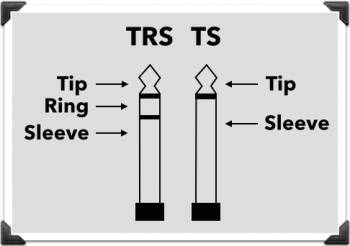
There are many different types of audio cables and connectors available today. However, Speakon and 1/4″ connectors are two of the most common ones used in live audio production.
Although both the Speakon and 1/4″ primarily do the same thing, that is, transfer audio signal from one device to another, they are used for different purposes. And that’s what you’ll learn in this article.
So what’s the primary difference between Speakon and 1/4″ connectors and cables?
Both Speakon and 1/4″ cables are used to transfer audio signal from one device to another. Speakon connectors and cables are mostly found and used on amplifiers and speakers. On the other hand, 1/4″ connectors and cables are mostly found and used on headphones, musical instruments, and mixers and audio interfaces.
There are some key reasons why audio gear manufacturers prefer Speakon connectors on amplifiers and speakers and why 1/4″ are commonly used for instruments and such. If you want to learn about that, then let’s get into it.
What is a Speakon Cable?

Cables that are connected to Speakon connectors are usually referred to as Speakon cables. Speakon cables are currently the music industry’s standard cable connector for amplifiers and loudspeakers. They are used in most professional audio systems to connect loudspeakers to power amplifiers.
According to Wikipedia, Speakon is a common name given to electrical connectors initially produced by Neutrik. When you open up a Speakon connector, one thing you’ll notice is that they either have a small screw or a solder cup for connecting cables. This makes it very easy to build and repair your own speaker cables.
There are actually three types of Speakon connectors. These are; NL2, NL4, and NL8 Speakon connectors.
The main difference between these three Speakon connectors is the number of speaker circuits each connector can handle. A speaker circuit is made up of a positive and a negative wire. For Speakon connectors, this positive and negative pair is referred to as a pin set.
NL2 connectors have only one pin set, hence allows for only one speaker circuit. NL4 connectors have two-pin sets, hence allow for two speaker circuits. The NL8 Speakon connector is larger than the rest and has four-pin sets, which allow for four speaker circuits.
What is a 1/4″ Cable?

Cables connected to 1/4″ connectors are referred to as 1/4″ cables. A 1/4″ cable is also referred to as a quarter-inch cable. 1/4″ connectors and cables had been the most preferred and dominant means of connecting amplifiers to speakers for many years until the introduction of Speakon connectors. Regardless, there are still many amps and loudspeakers that make use of 1/4″ connectors.
Unlike Speakon cables that are primarily used to connect speakers to amplifiers, 1/4″ cables serve a lot of other functions. You can check out our article that talked about XLR and ¼ inch to know more about 1/4″ connectors. But let’s briefly talk about the two types of 1/4″ connectors and cables.
1/4″ TS Cables
1/4″ TS cables are generally used for sending mono, unbalanced signals. They have connectors that come with two contact points known as Tip (T) and Sleeve (S). An insulator ring separates these two points.
In this connector, the Tip serves as the positive, with the Sleeve serving as the ground. This means audio signals travel over the Tip while the ground uses the Sleeve. TS cables are also known popularly as instrument cables or guitar cables. And that’s because they are used for connecting guitars to guitar amps, audio interfaces, pedalboards, or mixers.
TRS Cables
1/4″ TRS (or Tip Ring Sleeve) cables are a three contact version of 1/4″ cables. This particular 1/4″ cable comes with a connector that has three contact points separated by two insulator rings. In this connector, the audio signal travels over the Tip while the Sleeve serves as the ground.
This is no different from what happens in TS connectors. However, TRS connectors have an additional ring added. TRS cables can be used for stereo signals as well as mono, balanced signals.
Is Speakon Cable Better Than 1/4″ Cable?
Speakon cables offer plenty of advantages over 1/4″ speaker cables. Speakon cables are more durable and offer a more secure connection to your speakers. They are safer to use as compared to 1/4″ speaker cables as well. And this makes Speakon cables overall better than 1/4″ cables.
A typical 1/4″ speaker cable will get the job done when you need to connect your power amplifier to your loudspeaker. However, Speakon cables have some useful features such as a secure locking mechanism among others. Later in the article, we’ll talk about all of the advantages of speakon cables over 1/4″ cables.
These put Speakon cables slightly ahead of 1/4″ speaker cables. 1/4″ speaker cables are also prone to the occasional jack failures.
Do Speakon Cables Sound Better Than 1/4″ Cable?
Speakon cables don’t sound better than 1/4″ speaker cables. In fact, there is no difference in tone between the sound produced by Speakon cables and that of 1/4″ cables.
In terms of quality of sound output, 1/4″ speaker cables function just as Speakon cables do. It is very hard to pinpoint a difference in the sound produced by using Speakon cables and that produced by using ¼ “cables.
So the goal of using is Speakon cables as opposed to 1/4″ cables is not to get a higher quality audio. Even if there is a difference in the sound quality of Speakon and 1/4″ cables, they are barely noticeable. And that shouldn’t be the reason for you to invest in Speakon cables.
Benefits of Speakon Cables Over 1/4″ Cables
Speakon cables have surpassed 1/4″ cables to become the music industry’s standard cable connector for amplifiers and loudspeakers. This is not surprising since Speakon cables have quite a number of benefits over 1/4 “speaker cables.
Let’s look at some of the reasons why Speakon cables have triumphed over 1/4″ cables.
Completely Shielded Contacts
As you may already know, power amplifiers, especially those used for huge PA speakers, transmit high levels of electrical current to speakers. That’s because those huge PA speakers and line arrays used in concerts and outdoor events require huge amounts of power to work.
The electrical current sent by these power amps is high enough to electrocute humans. And one way these power amps can electrocute us is through the audio connectors and cable we plug into them.
And this is one advantage Speakon cables have over 1/4″ cables.
Unlike 1/4″ cables that have connectors made of metal, Speakon cables have shielded connectors which makes them safer than 1/4″ cables. The contact points of Speakon connectors are internal and not exposed. Hence there is little or no risk of being electrocuted accidentally.
Speakon connectors have a plastic exterior as well. This makes it safe when connecting or disconnecting them.
The completely shielded contacts of Speakon cables also serve to protect them from environmental conditions such as dirt, corrosion, and oxidation, which can cause cables to fail in the long run.
This can also be attributed to the fact that Speakon connectors self-clean each time you use them.
1/4″ connectors, on the other hand, use their exterior Sleeve as a conductor. This means they have their contacts exposed, which may cause electrical shorts or even electrocute individuals who grab the wrong spot on the cable.
Also, the contact points of 1/4″ cables may be subjected to dirt, corrosion, and oxidation, which may degrade the quality of your cables with time.
Easy to Identify Among Musical Cables
From observation, it is not difficult to notice that Speakon cables look different from other musical cables. Speakon cables have distinctive black and blue circular connectors, which are way different from 1/4″ and XLR cables.
This makes it easy to identify Speakon cables from other musical cables in venues and rooms with poor illumination. This comes in handy during cable organization and equipment setup. With Speakon cables, there is no possible confusion or mix-up with instrument cables.
This means you won’t accidentally plug your instrument cable into your amplifiers on a dark stage.
Highly Secure Connection – “Twist and Lock” Setup
Speakon connectors offer a highly secure connection when you attach them to your speakers. These Speakon connectors come with a twist and lock feature. This means that you need to twist the Speakon connector when attaching it to the input receptacle of your speaker to achieve an incredibly secure connection.
This makes them more secure and reliable than 1/4″ connectors. This is because there is little or no chance of your Speakon cable getting detached mistakenly during live shows or events.
There are lockable 1/4″ jacks that offer secure connections like Speakon connectors do. However, these are rare and very hard to find. They are even more expensive than normal 1/4″ connectors and Speakon as well.
With Speakon connectors readily available nowadays, why would anyone go through the trouble of searching for these lockable 1/4″ jacks?
It is worth noting that this twist and lock style of connecting and disconnecting Speakon cables makes them self-cleaning as well. This removes any possible build-up of dirt or corrosion.
Capable of Carrying More Power
Speakon connectors are built to provide a relatively better power transfer. Hence, Speakon cables are able to carry high current and are recommended for bass rigs and subs. This makes them ideal for driving powerful amplifiers.
In extreme cases, some high-powered amplifiers can blow out 1/4″ connectors. The size of the wires used to make 1/4″ cables are not suitable for carrying speaker signals of over 175 watts or 50 volts. This is because there is a risk of electrical shock from the connector ends at such high levels of power.
That is why Speakon connectors are made to accommodate thick cables, which are sufficient enough to handle the loads that may pass through them. Due to this, Speakon cables are recommended for public address systems where great power is required.
Easy to Service When Connector Removes
If a wire gets loose or pops out of a Speakon, you can simply put it back in and tighten it with a screwdriver. This is different when it comes to 1/4″ connectors.
When a 1/4″ cable gets loose from its connector, you will need a soldering iron and lead in order to fix it. The soldering process of fixing 1/4″ cables can be quite overwhelming if you are not used to doing it.
Benefits of 1/4″ Cable Over Speakon Cable
Here are the few benefits 1/4″ cables have over Speakon cables.
It is Cheaper
1/4″ cables are inexpensive. They are much cheaper than Speakon connectors; however, there is virtually no difference sound-wise between the two.
Since a 1/4″ cable will work as efficiently as a Speakon cable in transmitting audio signals, you can go in for a 1/4″ cable if you are low on cash.
Ease of Connecting and Disconnecting 1/4″ Cable
While going through several posts and forums, some people actually cited this as a reason for choosing 1/4″ cables over Speakon cables. They felt 1/4″ cables are easier to connect and remove due to the absence of any form of twisting and secure locking mechanism.
Though people who have used Speakon cables for a long might find it hard to see things from this angle, it is easier to connect and disconnect 1/4″ cables than Speakon cables.
Can You Connect Speakon to a 1/4″ Connector?
You can definitely connect a Speakon connector to a 1/4″ connector. Speakon connectors can be connected to one end of a cable and the other end is connected to a 1/4″ connector without facing any issue. Also, there a Speakon to 1/4″ adapters that allow you to connect a 1/4″ connector to a Speakon connector.
A speaker cable with Speakon connectors at one end is compatible with a 1/4″ connector at the over end. There will be no difference in the signal as well if your connectors are different at each end of the cable. You will only notice a difference if the connectors are of poor quality or build.
There are even lots of Speakon to 1/4″ speaker cables on Amazon and other music shops you can pick up right away. Here is an excellent Speakon to 1/4″ cable on Amazon you can order right now. And they get the job done.
Also, there are Speakon to 1/4″ adapters you can use if you want to connect a Speakon cable to a 1/4″ cable. They serve as a bridge between the speaker and the 1/4″ cable, linking them together. And they are really cheap too. Hosa 1/4″ to Speakon Neutrik Adapter (on Amazon) is quite a handy adapter you should have in your toolbox as an audio engineer.
Conclusion
Speakon and 1/4″ cables are great and very efficient in transmitting audio signals. However, Speakons are the modern way of connecting amplifiers to speakers. Speakon cables are far superior to 1/4″ cables when it comes to connecting amplifiers to speakers. They last longer and offer a more secure and safer option than 1/4″ cables.

Hello, I’m Elijah. A writer on Geek Musician, based in Ghana-West Africa. I am a writer with a passion for research and reading. I usually spend my free time playing chess or watching movies. For more info, check out my about me page. Or read more of my articles here.
